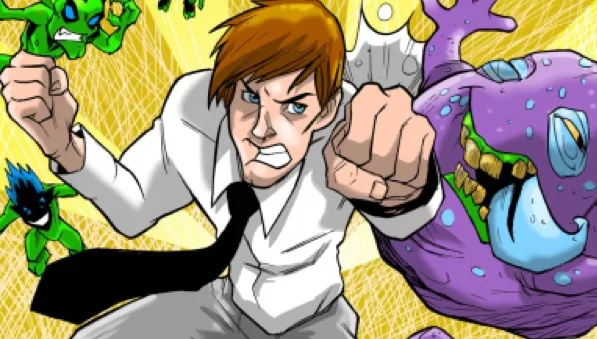
Being diagnosed with type 1 diabetes can be a confusing and difficult experience, especially for young adults and children. That's why Dr Mayank Patel and Professor Partha Kar collaborated with Revolve Comics to create an exciting online comic book series on type 1 diabetes. We spoke to Doctor Mayank Patel to find out more about his experience in developing the comics.
The comics are free to download below and on the Revolve Comics Website.
Can you tell us a bit more about the comics and the idea behind their development; what is their purpose?
So, let’s rewind to 2014 or 2015 – myself and a good colleague and friend of mine, Professor Partha Kar came together with a shared interest in nerdy stuff– movies, sci-fi and those sorts of things. We’d both heard stories from people with type 1 diabetes about when they were first diagnosed as children or youngsters, it could all feel quite impersonal. They’d be given medical leaflets, or their parents were given a medical leaflet and they received nothing. It could also be quite difficult for them to seek advice and information in a way that would work for them.
Our idea was to create something novel, something visually striking, that wasn't already available, to reach and engage, to inform and entertain – but not take away from the seriousness of type 1 diabetes. But to try and find a way to approach a serious issue through a different vehicle.
How were comics chosen as the platform for this educational messaging?
Why the comic book? Think about some of the superhero characters we've grown to love - for example - the Incredible Hulk. He's found himself in a situation where he's got this ability to transform into a big monster which, like it or not, is something that happens to him. So, he's found himself in a situation that he doesn’t want and he’s trying to find the cure. Then he, sort of, accepts his situation, whilst finding it challenging and frustrating along the way.
And with type 1 diabetes, there is a parallel along with other superhero stories as well as the Hulk, but he is one of the most well-known. I think of it as someone who finds themselves in a situation with newly acquired powers. They have abilities or something different about them from everybody else.
We just wanted to add to that suite of resources out there in a different way through the comics.
We noticed many people contributed to the development of the comics. Who is currently involved in their development, and who helped shape the stories?
When we first began, Partha floated the idea on social media to see who might be interested in doing comic books for education on type 1 diabetes. And interested parties gave us a shout.
We never felt we could tell the story of somebody with type 1 diabetes on their behalf. It had to be told from a personal lived experience. So, individuals put themselves forward - sharing personal parts of their stories and lives, and we chose elements that we felt were a good representation or could reflect other people’s situations without breaking confidence. We wanted to turn those difficult challenges into something positive – not by celebrating them – but by giving others something they could relate to.
As far as I know, Partha’s not an accomplished artist, nor am I – though I did get a grade B in GCSE art! And to bring these words and stories to life, you need imagery. Very fortunately, Partha met Danny from Revolve Comics. To develop comics with a professional comic book company who have specialised in healthcare conditions for the last eight years has been amazing.
Do you use the comics in your clinical practice? How do you recommend HCPs use them?
Our hospitals are teaching hospitals and I also teach medical students. As part of my undergraduate lectures, I always signpost to these when I do a type 1 talk or lecture. I always have a slide saying, “have you seen these comics?”
We used some charity funds to print off hard copies of the comics – as an alternative to just reading online. We never want to charge for these, so they're always going to be free online at least. These are a labour of love and we've loved developing them.
I oversee the adult insulin pump service in Southampton, so for any new patients who join us from the children's team, as an icebreaker, I offer them hard copies of the comics. I often say something like, “oh, by the way, do you like comic books?” Their faces light up just by looking at the cover. Just that immediate emotional response is really humbling and so lovely to see. They go, “wow, this is great. I can't wait to read this” or “I can't wait to share this with my family or my friends.”
That's the best place I think it's landed for me clinically. My approach to clinical care is very conversational. When I see a patient in clinic or on the ward with type 1 diabetes, I might comment on their Star Wars t-shirt or a Superman t-shirt that they are wearing. I might then go back later and just drop a hard copy for that person to lighten their mood in the hospital if they expressed an interest.
We just try and break the ice. “Who's at home with you? Do you work? What are your hobbies?” You try and break the ice and if anything comes up on cinema, movies or that sort of thing, then there's an opportunity there.
They can read the comics, share them with their family and friends, younger siblings, children, parents etc. We do our best to try and pick the right person for the comics.
How were the topics included in the comics chosen?
The first one had to be “What is type 1? Where's it come from?” 'Origins' was deliberately chosen as the title based on the X-Men superhero origins comic theme, where someone’s story begins. In subsequent volumes – without too many spoilers – Partha and I tried to pick themes that we both encounter clinically, and that people often ask questions about. This includes low sugars, high sugars, I'm traveling, I don't feel very well, I'm drinking alcohol, etc. We essentially tried to pick common type 1 topics and give them an interesting narrative.
*SPOILER ALERT*
The next few questions are edition specific, so consider giving the comics a read before moving on.
In volume 1, there is a theme around speaking to others with type 1 and getting peer support, what role do you think healthcare professionals have in helping people who are newly diagnosed find and get this support?
The coronavirus pandemic has made it very hard to get face to face contact with healthcare professionals. I think that it’s critical for healthcare professionals to signpost individuals to relevant peer support.
Equally, I'm mindful that some social media can be a forum for showing off. But what works for one might not work for all, and potentially breed insecurity and resentment. We've got a body of individuals sharing expertise and ideas and it can be reassuring and helpful for some if they're interested in that way of doing things. But it's not for everyone.
We can also signpost people to appropriate online resources as well. The comics are one example, but charities like Diabetes UK are an important asset and resource. So much information is out there, and I think that the healthcare professional’s role, it’s really in signposting to relevant good online trusted information, as well as connecting the person with the right groups of people.
But equally I'm mindful not to police the internet for them, but instead encourage caution as the internet is filled with a lot of untruths and dangerous inaccuracies.
In volume 2 there was a medication error – why did the authoring team think this was important to include?
It's very easy to present everything as fluffy, light and great, and say nothing ever goes wrong. But we all know the real world is not like that. So, this is our metaphor for the real world.
Partha and I are both heavily involved in inpatient diabetes care, both developing services and delivering care to people with diabetes. I think it’s important to tell an honest open story because in the real world there are people living with type 1 reporting terrible hospital experiences. We can't ignore that or gloss over it.
In volume 3 there is a lot of mention about language and how we can tackle stigma through words. Do you have any advice for those who want to address the language they use and challenge diabetes stigma (for example, stop using the term “diabetic”)?
I'd like to think we live in kinder, more accepting times. I think the Language Matters document that was launched a few years ago is an essential read for the diabetes community.
Since I read that I've definitely changed how I talk about diabetes.
I remind people how hard diabetes is to live with and the fact that patients don't get very much support outside of hospital care. Healthcare professionals should not use their personal prejudices in a brief meeting with a patient to make judgements about that person’s life. It's unfair, so I try and challenge that as well.
How do people contribute to authoring or share their ideas?
I guess the easiest way people can contribute is probably with their ideas on the narrative.
I've got a Twitter handle (@mbrp1) which people can tweet me directly, or Partha (@parthaskar). They can drop him a line as well and share their thoughts on what we could work on, including a theme. The challenge is that including everything is very hard. We try to be quite broad but at the same time cover common themes without getting too niche. We try to pick things that are relatively common so that they can resonate with a lot of people.

More on Doctor Mayank Patel
Consultant in Diabetes, University Hospital Southampton NHS Foundation Trust
Dr Mayank Patel has been a Consultant in Diabetes in Southampton, UK since 2008. In that time, he has been the clinical lead for his hospitals’ diabetes service and supports other hospital-based diabetes services. He is also a Diabetes UK Clinical Champions.
Mayank has worked tirelessly to develop the Inpatient Diabetes Service, which has helped to raise standards of care and the profile of diabetes across his hospital. He was instrumental in developing and delivering both an adult insulin pump and multidisciplinary foot clinic in the hospital.
Mayank has a keen interest in education and regularly talks at local diabetes meetings for patients, the public and healthcare professionals. He has an active role in the diabetes curriculum for Medical Students. He co-developed ‘DiAppbetes’, a smartphone application to help non-specialist staff manage inpatient diabetes, as well as a local inpatient diabetes e-learning tool for clinical staff.
Read the comics
The comics are free to download on the Revolve Comics Website. They provide information and entertainment and are a fun way to supply diabetes related messaging to everyone – especially to those who love comic books.
Read volume #1 Type 1 – Origins
Read volume #2 Type 1 – Attack of the Ketones
Read volume #3 Type 1 – S.T.I.G.M.A.
Read volume #4 Type 1 – Generations
The views and opinions expressed in the ‘views’ section of this website belong solely to the author of each article. These views and opinions do not represent those of Diabetes UK as a charity or any of its staff members.
